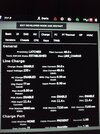gearchruncher
Well-Known Member
Thanks, I see that now.The PCS is one module that has three "phases" inside it. The $1800 repair is to replace the whole module, which means you get all 3 phase electronics new.
I know you had it in quotes- but they aren't phases, which could be confusing since the USA uses 1 phase service. It's just 3 identical blocks inside one PCS module. Tesla also sells a 32A one that is only two blocks for the lower spec cars. But the reason it's 3 blocks is that in countries with 3 phases, the basic design can be used there with minimal changes as well.
As Tesla says in their own parts manual, under "HV Battery Electrical Components:
I really wonder which of the 40 items listed under "HV Battery Electrical Components" are covered by the "Battery warranty" and which ones aren't....
Tesla's pretty bad at warranty language. Tell me this doesn't apply to the new "12V" li-ion batteries (direct quote from the warranty booklet):



